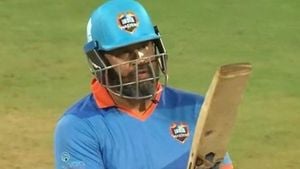AMSTERDAM - A Dutch court has recently ruled against Jonathan Meijer, a controversial sperm donor known for fathering over 550 children via donations. The ruling mandates Meijer to cease posting videos on his YouTube channel where he addresses these children and their parents, marking what many view as an important step toward safeguarding the privacy of donor offspring.
The court, situated in The Hague, has ordered Meijer to remove existing videos from his channel, affirming the necessity for parental consent for any direct communication with his donor children. This landmark ruling is particularly significant considering the growing concerns surrounding mass donation and its ethical ramifications, as Meijer has been accused of overstepping boundaries.
Joyce Zwaart, a mother of one of Meijer's children, expressed her relief with the court's decision, stating, “This ruling helps us protect our children from unwanted influence.” The judge acknowledged parents' worries about Meijer's influence over their children through his sometimes bizarre and morally ambiguous content.
During the proceedings, the court addressed the question of whether Meijer was infringing on established guidelines about contact with donor children. According to the ruling, Meijer had previously agreed to not take on an active parental role, leaving the initiation of any contact strictly to the children, thereby confirming the importance of parental authority.
Meijer’s YouTube videos range from the peculiar, such as consuming raw pig brains, to sharing advice on relationships and personal wellness. His approach, often shrouded in controversy, was the crux of the court's decision. The judges emphasized the need for Meijer to understand the potential impact of his content on the impressionable minds of his offspring, stating, “It would reflect well on him if he considers the viewing audience of his videos.”
Despite being allowed to continue creating and posting videos on other topics, Meijer is now restricted from discussing his children or their lives, with potential fines of €10,000 per day should he fail to comply, capping at €100,000.
The ruling came after Zwaart, alongside the advocacy group Stichting Donorkind, contested Meijer's filming practices. While the judge deemed Zwaart's case partly unsuitable for individual litigation, the broader issue of parental rights and the protection of donor children remained firmly at the forefront of the discussion.
Talented attorney Lotte van Schuylenburch, representing the concerned parents, strongly argued for the safeguard of children's rights against the backdrop of Meijer's viral popularity. “Children are vulnerable and susceptible to external influences,” she pointed out, reflecting the anxiety many parents feel about the potential repercussions of Meijer's online presence.
Interestingly, Meijer's attorney, Kasper Ripken, contested the notion of censorship, stating concerns about limiting his client's freedom of expression. He argued, “They are aiming to gag my client, which undermines fundamental rights.” The court, maintaining its focus on child protection, weighed these liberties against the psychological impacts Meijer's videos might have on minors.
Critics argue about the social responsibility of mass donors, as their ability to reach numerous offspring can lead to complex family dynamics. Former pastor Michiel Aten, who is also involved with the donor community, commented on societal perspectives of sperm donors, explaining, “Donor fathers are not all selfish individuals seeking to have multiple children indiscriminately.” Aten’s group aims to alter the public perception of donors, showing the varied motivations behind those who choose to donate.
Following this ruling, many are left questioning the future of relations between sperm donors and the children they father, especially as commercial sperm banks gain traction internationally. Reports from 2024 indicated substantial rises in foreign sperm donors, fostering concerns of donors with numerous descendants. Such expansion amplifies the necessity for transparent policies protecting the rights and well-being of all parties involved.
Despite the ruling's clarity, the case shines light on the growing pains of modern family dynamics—where technology interacts with interpersonal relationships. The court's insistence on balancing freedom of expression with the moral obligations of donors marks the legal terrain shifting as society adapts to new ethical dilemmas.
Internally, parents of donor children reiterate their worries about the Oklahoma-born donor's influence and continue advocating for stronger guidelines concerning donor rights and familial privacy. Zwaart's perspective resonates with many, advocating for the dignity and protection of children born through donation. “It’s about creating boundaries,” she implored, underlining the necessity for protocols to prevent potential emotional manipulation.
Closing this chapter of legal discourse, the focus remains on establishing lasting frameworks for all parties involved and securing the rights of donor children. A world where well-being is considered alongside unregulated sharing of personal opinions on social media platforms might just be on the horizon.



